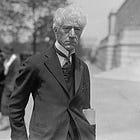This is Throwbacks, a newsletter by me, Michael Weinreb, about sports, history, culture and politics, and everything in-between.
If you like what you read, please click the button below, join the mailing list for FREE and please share, on social media or through e-mail or however you feel comfortable sharing.
And if you’ve been reading for a while, please consider a paid subscription to unlock certain posts and help keep this thing going—you’ll also get full access to the historical archive of over 250 articles. (Click here and you’ll get 20 percent off either a monthly or annual subscription for the first year.)
(If your subscription is up for renewal, just shoot me an email and I’ll figure out a way to get you that discount, as well. If you cannot afford a paid subscription and would like one, send me an email and I’ll comp you one, no questions asked.)
I. What does it mean to say, “Obviously, a person no longer with us cannot represent a threat to the integrity of the game”? Is it really obvious at all?
I have been turning this sentence over in my head ever since baseball commissioner Rob Manfred cited it as the primary justification for reinstating Pete Rose and a handful of other baseball players who were permanently banned from the sport, thereby making them eligible for induction into the Hall of Fame. It has led me to browse theological websites and click on philosophical treatises about death and absolution, and I am still not entirely sure what to make it. I suppose it makes literal sense—the dead can no longer do direct harm to humanity—but this whole argument is not about whether Pete Rose was somehow going to walk into the Reds clubhouse and offer current players a discount to sign up for DraftKings.1 This whole argument is about how we reconcile with the complexities of history—and baseball, in particular is a sport that lives in its history. And in that way, I’m not sure I get it at all.
Pete Rose gambled on baseball. That much is clear. Gambling on the sport in which you are participating is a transgression that perpetually threatens the integrity of the game. By absolving Rose and others, are you actually saying to future generations that your sins will not endure—that you can rest easy, in a spiritual sense, because you will be forgiven (or at least no longer viewed as a threat) in death?
And how far do we extend that principle? What about O.J. Simpson? What about Hitler? Pete Rose is not O.J. Simpson, of course, and he is definitely not Hitler, but does this mean that we can somehow separate O.J. Simpson’s football legacy from the alleged murder of two human beings? Does this mean the ideas Hitler advocated and the actions that he took are no longer a threat to the integrity of a civil society because he’s not around to espouse them?
II. What is a Hall of Fame, anyhow?
I have written previously in this space that I believe Halls of Fame should be regarded as museums, and that museums should reflect the full spectrum of history, particularly at a moment when that history is under direct threat by autocratic forces. For that reason, I believe Pete Rose should be in the Hall of Fame, just as I believe the NFL player Jim Tyrer—who had an impeccable on-field resume, but also murdered his wife and then committed suicide—should be in the Pro Football Hall of Fame, and that their transgressions should be prominently included as part of their story.
There are people who also believe that a Hall of Fame should be a hall of heroes, but I think that is also a whitewashing of history, because in that case, who decides who gets to be a hero and who doesn’t? Do we wind up, as we’ve done with the steroid era in baseball, locked into an odd purgatory where we’re attempting to turn away from the ugly truths of humanity rather than acknowledge that life is incredibly complicated?
III. What does Benny Kauff have to do with any of this?
In December of 1919, a centerfielder named Benny Kauff, one of the best players in the National League, was arrested for stealing a car alongside his brother. Commissioner Kenesaw Mountain Landis suspended Kauff until his trial in 1921, at which he was acquitted by a jury in under an hour. And then Landis decided to play judge and juror himself, and refused to reinstate Kauff based on his own hunch that Kauff was guilty. For more than a century, Kauff was permanently banned from the sport based on a capricious dictatorial ruling that he could do nothing to change. And then one day he was suddenly reinstated, only because Pete Rose was suddenly reinstated.
IV. How much does politics play into all of this?
That Manfred’s change of policy came in the wake of the president’s crass public lobbying for Rose’s reinstatement raises a whole thicket of additional questions. Was it simply that Rose’s death created an opportunity to revisit the issue? Or was this a decision made out of political expedience? As The Athletic’s Ken Rosenthal writes:
Manfred is nothing if not shrewd. He surely did not want to risk the president embarrassing him publicly on social media. He also likely did not want to get on Trump’s wrong side at a time when he is pushing for a direct-to-consumer streaming service for the league, and the migration from broadcast to streaming by professional sports leagues is under government scrutiny. Also, while Trump is known to be pro-management, it’s not out of the realm of possibility that, if sufficiently annoyed, he could threaten baseball’s antitrust exemption.
You don’t have to look hard to unearth evidence of Manfred’s jelly-legged sense of morality. You also don’t have to be Carl Jung to wonder whether the president sees something of himself in Pete Rose—that perhaps he is thinking that he will someday be forced to justify his own transgressions, and that by demanding forgiveness for Rose’s prodigious lies, he is attempting to clear the way to forgiveness for himself. Which brings me to my next question.
V. How much does real remorse actually matter?
Keep reading with a 7-day free trial
Subscribe to Throwbacks: A Newsletter About Sports History and Culture to keep reading this post and get 7 days of free access to the full post archives.






